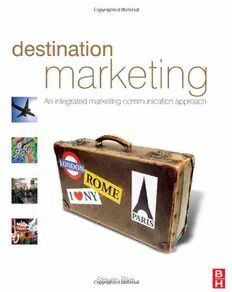
Destination Marketing: An Integrated Marketing Communication Approach PDF
423 Pages·2008·7.19 MB·English
Most books are stored in the elastic cloud where traffic is expensive. For this reason, we have a limit on daily download.
Preview Destination Marketing: An Integrated Marketing Communication Approach
Description:
The tourism market is fiercely competitive. No other market place has as many brands competing for attention, and yet only a handful of countries account for 75% of the world's visitor arrivals. The other 200 or so are left to fight for a share of the remaining 25%. Therefore, destination marketers at city, state and national levels have arguably, a far more challenging role than other services or consumer goods marketers. Destination Marketing: an integrated marketing communication approach focuses on the five core tenets of integrated marketing communications. These embody both the opportunities and challenges facing Destination Marketing Organisations (DMOs), and are: 1. Profitable customer relationships; 2. Enhancing stakeholder relationships; 3. Cross-functional processes; 4. Stimulating purposeful dialogue with customers; and 5. Generating message synergyThe author seeks to provide a rationale for DMOs; to develop a structure, roles and goals of DMOs; to examine the key challenges and constraints facing DMOs; to impart a destination branding process; to develop a philosophy of integrated marketing communications; to lead the emergence of visitor and stakeholder relationship management; and to set forth options for performance measurement. - The only textbook to examine Destination Marketing Organizations - Directly links academic theory with industry practice, illustrated with up to the minute international case studies and examples- Provides a clear framework for designing, implementing and monitoring a competitive strategy based on Integrated Marketing Communications
See more
The list of books you might like
Most books are stored in the elastic cloud where traffic is expensive. For this reason, we have a limit on daily download.
